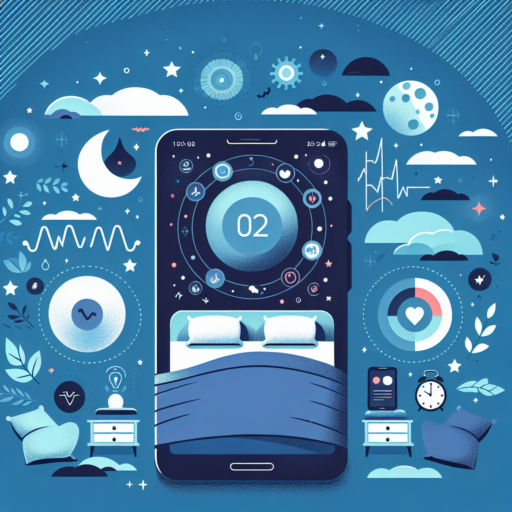Understanding How Sleep Apps Work
Sleep apps have gained popularity over the years for their role in helping people improve their sleep quality. These apps typically use a variety of techniques and technologies to monitor sleep patterns, understand sleep behavior, and provide insights or suggestions to improve sleep. By analyzing user data, sleep apps can offer personalized tips and strategies tailored to individual sleep needs.
Accelerometers and sound analysis are common methods used by these apps to track sleep. Accelerometers in smartphones or wearable devices detect body movement during sleep, distinguishing between different sleep phases. Meanwhile, sound analysis technology listens for snoring, sleep talking, or other noises that might indicate sleep disturbances. This data is then processed to provide users with a detailed overview of their sleep cycle, including the duration of REM and deep sleep phases.
An essential feature of many sleep apps is the provision of sleep quality scores. By considering various factors such as sleep duration, wakefulness, and restfulness, these apps calculate a score that gives users a clear understanding of their sleep quality. Many apps also incorporate relaxation techniques, such as guided meditations or soothing sounds, to help users fall asleep more easily. This multifaceted approach not only aids in tracking sleep but also supports users in developing better sleep habits.
No se han encontrado productos.
The Technology Behind Sleep Tracking Apps
Sleep tracking apps have revolutionized how we understand and monitor our sleep patterns. These innovative tools leverage a combination of advanced technologies to provide users with detailed insights into their sleep quality, duration, and cycles. At the core of these apps are sophisticated algorithms that analyze various data points to offer personalized sleep recommendations and improvements.
Accelerometers and Actigraphy
One of the foundational technologies in sleep tracking apps is the accelerometer. This sensor, commonly found in smartphones and wearable devices, detects and records body movements during sleep. By employing the principles of actigraphy, sleep tracking apps can distinguish between different sleep states such as light, deep, and REM (Rapid Eye Movement) sleep. This data plays a crucial role in understanding sleep patterns and identifying any potential disruptions.
Sound Analysis and Snore Detection
Advancements in microphone technology and sound analysis algorithms also contribute significantly to the functionality of sleep tracking apps. These apps often utilize the device’s microphone to record sound levels and patterns throughout the night. Sophisticated algorithms then analyze these recordings to detect snoring, sleep talking, or other potential indicators of sleep disturbances. The ability to track and analyze these audio cues adds another dimension to sleep monitoring, offering a more comprehensive overview of sleep quality.
Together, these technologies form the backbone of sleep tracking apps, providing insights that were once only available through professional sleep studies. By continuously innovating and integrating new features, such as oxygen saturation monitoring and heart rate tracking, these apps are set to further enhance our understanding of sleep health and wellness.
How Do Sleep Apps Monitor Your Sleep Stages?
Understanding how sleep apps monitor your sleep stages involves diving into the intricate world of technology and physiology. These innovative tools primarily utilize the accelerometer in your smartphone or the sensors in wearable devices to track movement throughout the night. As you cycle through different sleep stages—from light sleep to deep sleep and REM (Rapid Eye Movement) sleep—your physical activity levels vary. Sleep apps analyze these variations to estimate which sleep stage you’re in at any given time.
In addition to movement tracking, some advanced sleep apps incorporate sound analysis to detect snoring or breathing patterns that may indicate you’ve entered a deeper sleep phase. By combining these data points with the information collected from the accelerometer or wearable sensors, the apps can offer a more comprehensive view of your sleep quality. This dual-modality approach not only enhances the accuracy of sleep stage detection but also enriches the feedback provided to users, helping them understand their sleep patterns better.
Moreover, many sleep apps have started integrating heart rate monitoring to add another layer of precision to sleep stage identification. Since your heart rate varies during different sleep stages, integrating this metric can significantly improve the app’s ability to discern precisely when you drift from light sleep into deep sleep or REM sleep. Through these sophisticated algorithms, sleep apps can offer insights into your sleep health, potentially uncovering trends and issues that could be affecting your overall well-being.
The Accuracy of Sleep Tracking Apps: What You Need to Know
As society becomes increasingly focused on health and wellness, the popularity of sleep tracking apps has surged. The premise is alluring: by monitoring your sleep patterns, these apps aim to help you optimize your rest for better overall health. However, when it comes to the accuracy of sleep tracking apps, there are essential aspects to consider.
Most sleep tracking apps utilize the accelerometer in your smartphone or wearable device to monitor your movement throughout the night. The theory is that by analyzing your movements, the app can distinguish between light sleep, deep sleep, and REM stages. Yet, this method raises questions about precision. Experts suggest that while these apps can provide a broad overview of your sleep patterns, they may not be as accurate in distinguishing between the sleep stages as one might hope. The accuracy can significantly vary based on the algorithm and sensors used by the app, and how you wear or position your device.
Moreover, several factors can affect the reliability of sleep tracking data. For instance, if you share your bed with a partner or pet, their movements can be misattribited to you, skewing the data collected. Additionally, these apps often assume that lying still equates to being asleep, which isn’t always the case. Therefore, while sleep tracking apps offer valuable insights into your sleep habits, they should not be relied upon for medical diagnoses or treatment without consulting healthcare professionals.
Understanding the limitations and capabilities of your sleep tracking app is crucial. When used correctly, these apps can be a helpful tool in your quest for better sleep and, consequently, better health. To get the most out of your sleep tracking app, consider its features, accuracy, and how you can integrate its findings into a comprehensive sleep improvement plan. Remember, while technology has the potential to enhance our lives, the key to better sleep might also include traditional methods such as maintaining a regular sleep schedule and creating a restful sleeping environment.
Comparing Top Sleep Apps: Features and Effectiveness
In recent years, a surge of sleep apps has hit the market, each promising to deliver a better night’s sleep with the help of technology. But how do these apps stack up against one another in terms of features and effectiveness? Let’s take a closer look at what some of the leading sleep apps offer and how they can impact your sleep quality.
Key Features Offered by Leading Sleep Apps
Most top-rated sleep apps share some common features designed to enhance your sleep experience. These often include sleep tracking, which monitors your sleep cycles and provides insights into your sleep patterns. Many also offer relaxation techniques, such as guided meditations or calming soundscapes, to help users fall asleep more easily. Furthermore, personalized sleep recommendations are becoming increasingly popular, with apps analyzing your sleep data to offer tailored advice for improving your sleep quality.
Effectiveness of Sleep Apps
The effectiveness of sleep apps can vary widely from person to person. However, several studies have shown positive outcomes for users who consistently use these apps. For example, users who engage with sleep tracking and follow personalized sleep recommendations often report improved sleep quality and duration. Meanwhile, features like calming soundscapes or relaxation exercises can significantly reduce the time it takes to fall asleep. Though not a replacement for medical advice, these apps can serve as a beneficial tool for those looking to enhance their sleep through non-invasive means.
It’s important to consider your personal sleep needs and preferences when choosing a sleep app. While some may benefit more from detailed sleep analysis, others might find relaxation features more effective for their sleep improvement. Regardless of your choice, integrating a sleep app into your nighttime routine could be a step towards achieving better sleep health.
Improving Your Sleep Quality with Sleep Tracking Apps
Improving your rest and overall health can significantly benefit from using sleep tracking apps. These innovative tools are designed to monitor your sleep patterns, helping to uncover the mysteries of your nighttime habits. By understanding how you sleep, you’re better positioned to make informed changes that can lead to a more restful and rejuvenating rest.
Identifying Sleep Patterns
One of the primary advantages of sleep tracking apps is their ability to identify your unique sleep patterns. By monitoring movements, sounds, and even heart rate throughout the night, these apps provide detailed insights into how long you spend in each sleep stage. This data is invaluable for recognizing the behaviors that may contribute to poor sleep quality, such as late-night use of electronics or caffeine consumption.
Personalized Sleep Improvement Tips
Equipped with knowledge about your sleep patterns, sleep tracking apps can offer personalized tips tailored to enhancing your sleep quality. Whether it’s adjusting your sleep environment, optimizing your bedtime routine, or even suggesting the best times to go to sleep and wake up, these apps become your personal sleep consultant. By following these tailored suggestions, you can make small adjustments that lead to significant improvements in your sleep quality.
- Monitor nighttime habits
- Receive personalized improvement suggestions
- Adjust sleep environments on recommendations
How to Interpret Data from Your Sleep App for Better Sleep Health
Interpreting data from your sleep app can transform your approach to sleep health, elevating your understanding of sleep patterns and identifying areas for improvement. These apps often provide a wealth of information, from sleep duration to sleep quality, including your sleep cycles such as REM and deep sleep. Understanding how to decode this data is crucial in leveraging technology to enhance your sleep health.
Understanding Sleep Stages
When examining your sleep app data, the first step is to understand what each sleep stage means for your rest and recovery. Most apps will segment your sleep into light sleep, deep sleep, and REM (Rapid Eye Movement) sleep. Light sleep aids in relaxation, whereas deep sleep contributes to physical recovery. REM sleep, on the other hand, plays a key role in memory consolidation and mood regulation. By analyzing the ratio of these stages throughout the night, you can gauge the quality of your sleep and identify patterns or irregularities.
Analyzing Sleep Patterns
Another critical aspect of interpreting your sleep app data is to look for patterns or changes over time. Consistency is more telling than a single night’s data; thus, observing trends will offer more insight into your sleep health. Note variations such as increased wakefulness or changes in sleep duration. These could be triggered by stress, dietary changes, or other lifestyle factors. Identifying these patterns enables you to address root causes or adjust your habits for better sleep quality.
Remember that sleep app data provides an overview of your sleep behavior, offering valuable insights but not diagnosing health issues. Anomalies should be discussed with a healthcare provider, especially if you notice persistent irregularities. Armed with this information, you can take proactive steps toward enhancing your sleep health, leading to improved overall well-being.
Tips for Choosing the Right Sleep Tracking App for You
With the plethora of sleep tracking apps available on the market, selecting the right one that suits your needs can be a daunting task. However, understanding what to look for in a sleep tracking app can significantly simplify this process. Below are some key considerations to help you make an informed decision.
Assess Your Specific Sleep Tracking Needs
Before diving into the ocean of available apps, take a moment to consider what specific features you are looking for. Are you interested in detailed sleep stage analysis, or do you need insights on how to improve your sleep quality? Some apps offer simple tracking functionalities, while others provide comprehensive sleep coaching. Identifying your personal needs is the first step towards choosing an app that can offer you meaningful insights into your sleep patterns.
Check for Accuracy and Reliability
Accuracy is critical when it comes to sleep tracking apps. Read reviews and research to find out how reliable the data provided by the app is. Remember, the primary goal is to gain valuable insights into your sleep quality, so opt for an app that uses advanced algorithms and has positive user feedback on its precision. Moreover, consider the technology it employs—some apps require wearable devices for more accurate tracking, while others can monitor your sleep through sound or movement detection using just your smartphone.
Consider the User Experience
Lastly, the usability of the sleep tracking app greatly affects your overall experience. An app with a user-friendly interface and straightforward navigation will make tracking your sleep effortless and enjoyable. Furthermore, customization options that allow you to adjust settings according to your preferences can enhance your sleep tracking journey. Choose an app that not only meets your tracking needs but also provides a pleasant and seamless user experience.
Frequently Asked Questions About Sleep Apps
When it comes to improving sleep quality, many people turn to technology for help. Sleep apps have become increasingly popular, raising questions about their efficacy, benefits, and usage.
How Do Sleep Apps Work?
Sleep apps typically use motion detection or sound analysis to monitor sleep patterns. By tracking movements through the accelerometer in your smartphone or recording sounds during the night, these apps can analyze sleep cycles and phases. Users often wonder about the accuracy of this data and its importance in improving sleep health. It’s essential to understand that while these apps can provide valuable insights, they’re not a substitute for professional medical advice.
What Benefits Can Sleep Apps Offer?
One of the most attractive aspects of sleep apps is their potential to enhance sleep quality. By providing data on your sleep patterns, they can help identify issues like irregular sleep schedules or frequent awakenings. Moreover, many apps offer features such as soothing sounds or meditation guides aimed at facilitating a more restful night’s sleep. It’s important to recognize that benefits can vary significantly from person to person, and effectiveness is often influenced by consistent use and adherence to sleep hygiene practices.
Are There Any Downsides to Using Sleep Apps?
While the benefits of sleep apps are compelling, users should also be aware of potential downsides. One concern is the accuracy of sleep tracking, which can sometimes give users a false sense of security about their sleep health. Additionally, the use of mobile devices in the bedroom can contribute to light exposure, potentially disrupting sleep patterns even further. Balancing technology use with good sleep practices is key to maximizing the benefits of sleep apps without experiencing negative side effects.




